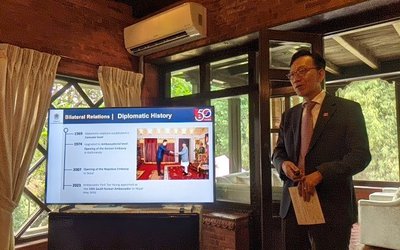
By working in the remote parts or in the urban areas of Nepal, INGOs have been providing a valuable support in the nation’s development efforts, at improving the situation of water and sanitation, climate change, environment, gender, media, education, disaster, health and poverty or other issues of the people with disability, or rights and what not.
INGO's involvement in the development process is all over Nepal. But why are they criticized?
"This is due to their failure to defend their work completed in Nepal. No one can deny their contribution in the transformation of Nepal," said Kunda Dixit, editor of Nepali Times.
Although they are visible actors in Nepal's development, their contribution is yet to be recognized and their role often remains negatively portrayed. To tell their case, the Association of International NGOs in Nepal (AIN) recently organized an interaction with the media.
"We don't want to claim we have made a lot of contribution. AIN wants reporting based on facts that promote development discourse," said Ashutosh Tiwari, chairman of AIN. "This interaction is organized to share our views on development."
Out of 240 registered INGOs in Nepal, over 100 INGOs are associated with Association of International NGOs in Nepal (AIN). They annually contribute 6 percent of the development budget, 12 percent of foreign Aid and 15 percent of total grant, 45 percent of loans and 18 percent of deficit budget to Nepal.
According to AIN, this result is based on the study, conducted in 2010, of 60 INGOs. If the study is conducted now, their contribution may go higher than this as the number of INGOs associated with AIN is already over 100.
"Whether in peace time or conflict, INGOs have been playing an important role in Nepal's development. We had made valuable contributions to carry out the development activities and other service delivery works during the conflict when the government was just confined to district headquarters," said former chairman of AIN and Country Representative of Practical Action. "We are also part of Nepalese society working hand and hand with the government to change the life of Nepali people."
INGOs are governed by the Social Welfare Council Act 2049. In accordance with the act, they need to submit their annual financial audit reports to SWC and all AIN members, registered with SWC, abide by its rules and regulations.
However, in the context of Nepal's development discourse, the role of INGOs is projected in a negative way. Instead of supporting their contribution, there is a feeling in general that INGOs are symbols of different kinds of institutions.
"INGOs have been part of Nepal's development process for a long time and want to build the relations with all the media. Our mission is clear, we want sustainable and inclusive development," said Lex Kassenberg, vice president AIN and country director of CARE-Nepal.
"We need to understand each other closely, including INGO’s functioning and dynamics. We also need to work together to address the dynamic needs of the needy and marginalized people," said Bharat Devkota, member of AIN. "We can play a complimentary role in a spirit of development partnership and to minimize the misunderstanding."
This is what is lacking. Media often complain that they don' have access to INGOs and AIN complains that media often report without verifying facts with the concerned INGOs. "The time has come for AIN and media to work together to highlight the development challenges and discourses," said Tiwari.
- NEPAL-THAILAND: Joint Business Council
- Apr 13, 2025
- BIMSTEC SUMMIT: Nepal’s Stand
- Apr 11, 2025
- IME GROUP: Expands Into Paper Industry
- Mar 24, 2025
- CPN UML: Instigated By India
- Mar 23, 2025
- ADB’S CHIEF ECONOMIST: Nepal Reduces Poverty
- Mar 11, 2025















